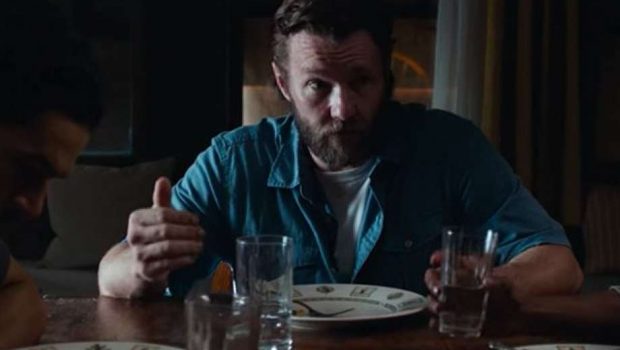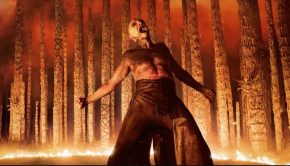It Comes at Night – Film Review
Reviewed by Patrick Condliffe on the 3rd of July 2017
Roadshow Films presents a film by Trey Edward Shults
Written by Trey Edward Shults
Produced by David Robinson, L.T. Hutton and James G. Robinson
Starring: Joel Edgerton, Carmen Ejogo, Christopher Abbott, Riley Keough, David Pendleton, Griffin Faulkner and Kelvin Harrison Jr.
Music by Brian McOmber
Cinematography: Drew Daniels
Edited by Matthew Hannam and Trey Edward Shults
Running Time: 91 minutes
Rating: MA15+
Release Date: the 6th of July 2017
The night embodies many of our fears. It’s often not what threatens to come at night under the cover of darkness that truly scare us, but rather the things we imagine to be waiting out there for us. Such terrors are not limited to the exteriors of our buildings, the forests bordering our cities, or the abandoned spaces in our suburbs. No, we carry our fears inside us like a disease. These fears steal our breath, pause our hearts, curdle our hope, and poison our love. In It Comes at Night, director Trey Edward Shults captures these horrors as they come to us in the night, in the dark, when we feel comfortable, and when we feel safe.
It Comes at Night tells the story of Travis (Kelvin Harrison Jr.) and his parents Paul (Joel Edgerton) and Sarah (Carmen Ejogo). The film opens with Travis’ grandpa, Bud (David Pendleton), dying from the illness, setting the scene for what follows. The family is living through a pandemic together in a secluded house in the woods with their grandfather. We don’t know where, and it doesn’t matter. Will (Christopher Abbott), his wife Kim (Riley Keough), and their young son Andrew (newcomer Griffin Faulkner) break into their lives and routines. It is an act of kindness and pragmatic survival that brings them together. As the families begin to cohabit, tensions rise between them. The adults’ concerns for their families begins to overwhelm them and motivate their actions. It Comes at Night begins grimly, and its dark tone doesn’t relent.
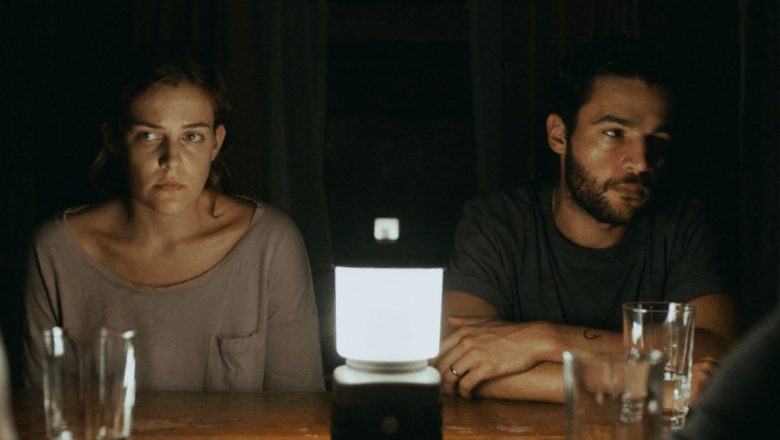
It Comes at Night is a teenage nightmare told from Travis’ perspective. Travis is a seventeen-year-old growing up during a pandemic. Everyday teenager’s life is fraught and lonely, being secluded in a self-imposed quarantine is doubly hard. Travis’ biggest obstacle is his age; at seventeen he is too old to be a child. Unlike the young Andrew, he is too big and too old to be coddled, yet he is too young and naive to be a man and have his independence. So, he must straddle two spheres – the adult and the child – but fit into neither. The introduction of Kim and her husband Will cultivates a familiar teenage awkwardness. He wants to have new friends, but he is also subject to the conflict between his teenage desires and his morality that arrive with their new housemates. Harrison Jr. delivers an excellent performance as he walks this precarious tightrope between adolescent naivete and manhood. Travis’ movements about the house, armed only with a lamp in the dark, amplify the film’s claustrophobia and dread. He snoops, childlike before curling into small spaces as if he hasn’t grown up. While Travis obeys his father Paul, knowing that his advice is for the best, he also bridles against his authority. He often seeks solace with Sarah, but she’s not always sympathetic to him. Travis earths the film as it segues between reality and surreal nightmare in a manner that makes it difficult to separate the two.

It Comes at Night is a beautiful film. Shults and cinematographer Drew Daniels imbue the oak and fir forest of the Catskills with majesty and stifling dread. They cultivate the house that stages much of the action into a character. They use a repertoire of tight shots and low lighting to capture the claustrophobic corridors and low ceilings which envelope and stalk the cast. Not since Kubrick’s Overlook has a home harboured so much menace. Its “Red Door” is both a barrier keeping the night and the dark at bay, while trapping the two families together. Its long, narrow hallways are crowded with portraits and paintings, making confrontation seem inevitable. The absence of light sources accentuates the isolation and fear in the house. The house creaks and groans continuously. The viewer is left unsure if it is the house or its inhabitants scurrying and plodding around on its flaws. Brian McOmber’s score throbs with uneasy bass that crescendos to unsettling screeches. While bursts of fire and light erupt amongst both the day and night, constant reminders of the pandemic and its consequences. The unknown space and silence of the woods gradually becomes the only tonic from what incubates in the house.
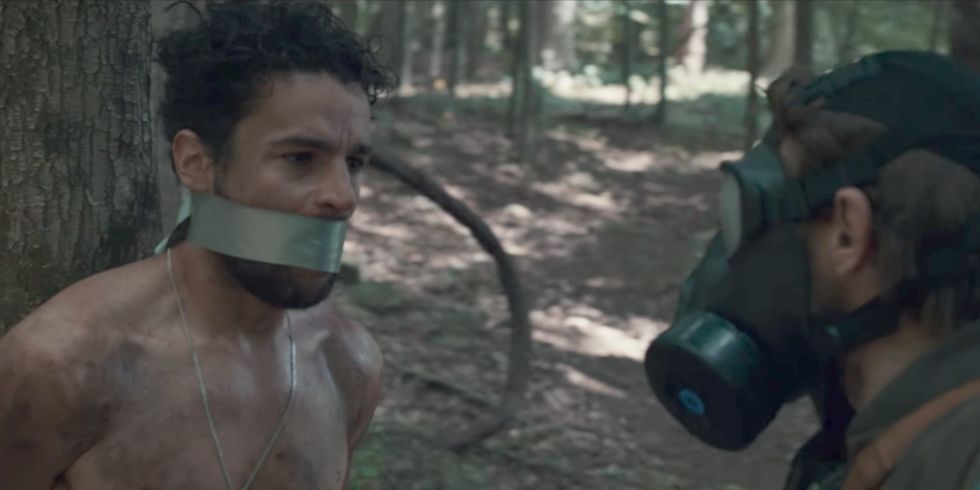
The ensemble cast deliver great performances. Edgerton and Abbott play very different men who are both struggling to be both moral while looking after the needs of their families. Their desire to bond is always tempered by their uncertainty of the other’s true motives and character. One man is a history teacher who yearns to be friendly and accommodating, the other a blue-collar worker who has reason to be wary of others. Their awareness of the precarity they live amongst pulls them apart and pushes them together. Sarah is the pragmatic wife, who is the voice of reason that guides Paul and Travis. Carmen Ejogo evokes a wonderful balance of concerned matriarch and pragmatic handywoman forced to wield cold determination. She has a maternal pragmatism that contrasts with her husband’s occasional idealistic naivete. She’s all compassion, until she’s not. By contrast, Will’s wife Kim is young and naive but totally committed to her family. Unfortunately, the women are left too much in the background. We don’t meet Kim enough, and Ejogo seems woefully underutilised. That said, the electricity between the cast as they sit around the table, playing solitaire, chopping wood, and suspecting one another is brilliant.
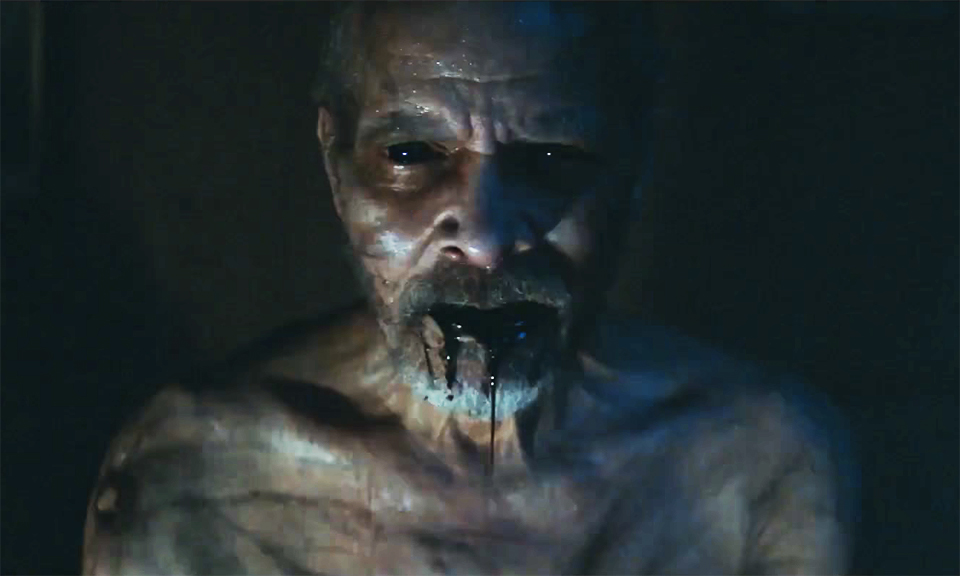
The time spent sitting around and developing relationships instead of character hurts the film. The pacing is inconsistent. In one scene, Paul remarks that when Grandpa Bud got sick “his symptoms came up in a day.” The audience knows that the illness is ruthless and horrific and strikes rapidly. But the film lulls in the second act and it is immensely frustrating. The audience is let off the hook. The first act combines excellent performances, and claustrophobic camerawork with McOmber’s creepy score and it winds the tension and dread to high. Music pulses and wails like a fever dream throughout the dark before ebbing away into daylight, only to be punctuated with bursts of flame and sticky gurgles. The silences are often laden with as much unease and threat as they are awkward and embody the characters’ struggle between morality and violence. However, as the families settle in and their silences become more comfortable, that tension goes into remission. When the tension eventually returns, it lacks the potency and terror it could have had with a shorter runtime and more character development.
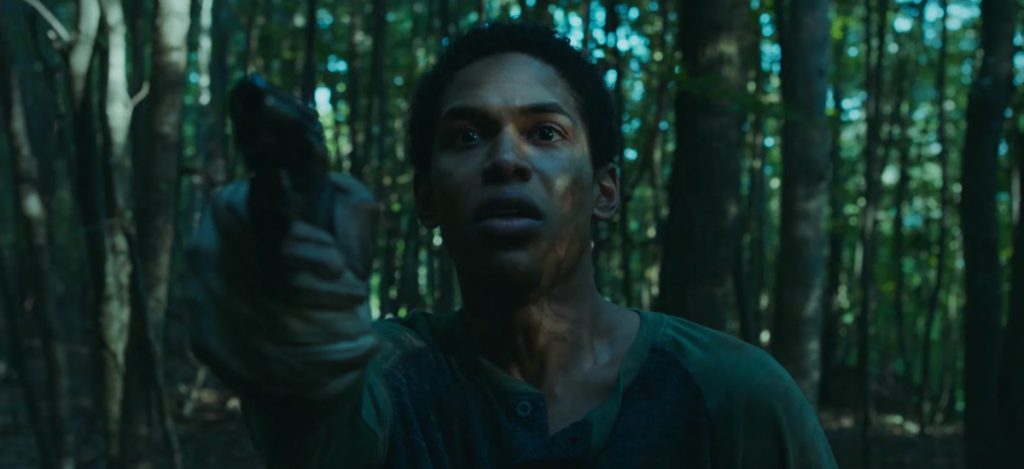
I really wanted to be swept up in It Comes at Night. I definitely enjoyed it, but it didn’t knock me dead. It Comes at Night invests itself deeply in trying to balance a contemporary cabin in the woods horror with an ensemble drama piece. But as much as he tries to, Shults doesn’t quite pull it off. In trying to be too many things, he lets go of the things he is doing well to achieve things that don’t pay off for the audience. For example, Pieter Bruegel the Elder’s The Triumph of Death hangs in Travis’ room in a startling contrast to his youth. It is introduced lovingly and in exacting and disturbing detail. When it is used later to characterise Travis though, it is glossed over and the tension and narrative development is squandered. This is symptomatic of the film’s problems, it is not the sum of its great parts.
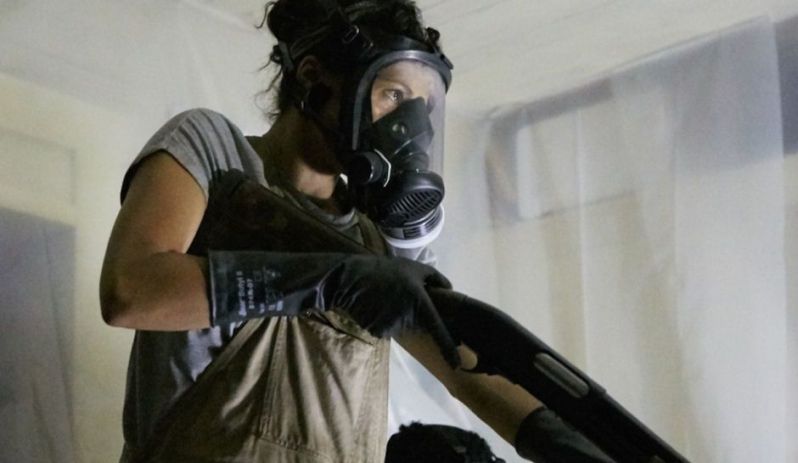
In the end, It Comes at Night is a good film and one that is worth watching. But it is not a great film. It delves into our fears of the dark and explores the debilitating effects of living in death’s shadow. It builds to a traumatic eruption of violence and tragedy that will linger with you like the remnants of a bad illness. However, in allowing its audience to convalesce It Comes at Night loses its horrific virulence to leave them gasping in their seats, but not on the floor.
Summary: In the end, It Comes at Night is a good film and one that is worth watching. But it is not a great film. 4 almost fatal fever dreams out of 5.


